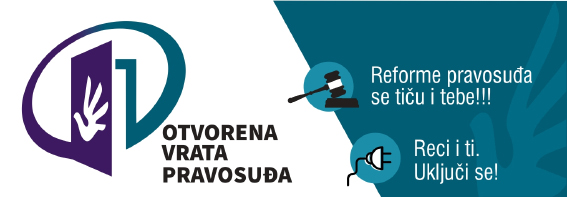Poll results - conclusions and recommendations
20.06.2024.
For the purposes of the Action Plan for the Judges’ Association of Serbia’s support to the High Judicial Council project, the Judges' Association of Serbia, with support from the Embassy of the Netherlands in Serbia and in Montenegro, and in cooperation with BIRODI, has conducted a poll research on the citizens' perception of the judiciary, based on the sample of 1000 pollsters. Here you can read an overview of the conclusions and recommendations adopted based on the poll's results.
CONCLUSIONS
- Knowledge of the judiciary and sources of information
1.1. Citizens do not sufficiently understand how the judiciary functions as one of the three branches of state power. Almost:
- 70% do not know their rights in court proceedings (43% in general, 26.1% partially),
- 80% do not know how the court functions (57.4% in general, 21.5% partially) i
- about 80% do not know what are the rights and obligations of public officials (61.6% in general, 19.5% in part) and public figures and the media (57.3% in general, 21.3% in part) in relation to the court,
taking into account that answers differ significantly depending on the occupation, education and fields in which the respondents work.
1.2. The majority of citizens are not interested in learning more about the judiciary - only 13.3% of citizens would like that.
1.3. The view of the judiciary is primarily formed on the basis of:
- informal sources - in almost ¾ of the cases (17.7% each from attorneys and other citizens, 14.3% via social networks, 11.1% from judicial staff, 8.2% from participants in court proceedings, 5.8% from judges),
- 7.9% via TV with national coverage and N1 and Nova S (RTS 3.6%, N1 1.5%, Nova S 1%)
- 3.6% from daily newspapers.
1.4. Citizens' opinion about the judiciary varies depending on the sources from which they get information about the judiciary:
- citizens who get information about the judiciary via the following media have a very negative opinion of the judiciary: N1 (81.8% negative, 6.1% positive), Nova S (72.7% negative, no positive opinion), Nedeljnik (66 .7% negative, no positive), Danas (72.7% negative, no positive)
- citizens who get information about the judiciary via TV Pink have a significantly more positive opinion of the judiciary (46.7% positive, 6.7% negative), while
- citizens who are informed by RTS have a more balanced view of the judiciary (29.5% of them have a positive opinion, and 30.8% have a negative opinion).
1.5. The almost non-existent information about the judiciary, that is, about the way it functions, in order to raise citizens' awareness of their rights and the importance of the rule of law, points to the conclusion that the courts are still non-transparent, as well as that the media, especially public media services, have failed in their role prescribed by law - to educate and publish content that is of public interest to citizens, aimed towards the realization of human rights and freedoms, exchange of ideas and opinions, fostering the values of a democratic society and improving tolerance, understanding and legal culture.
- Perception of the judiciary and experience with the court
2.1. More than two thirds of citizens (70.8%) had no experience with the court.
2.2. Although only 25% of citizens had experience with the court, the image of the judiciary is created by 70% of citizens who had no experience with the court as well.
2.3. Almost 40% of the citizens who had no experience with the court have a negative view of the judiciary.
2.4. 42.85% of citizens who succeeded in all or most of the court proceedings have a negative attitude towards the judiciary.
2.5. Citizens who have failed in all cases have a better opinion of the judiciary than those who have never participated in court proceedings, because 22.2% of citizens who have failed in all cases and 16.9% of citizens who have never participated in court proceedings have a positive opinion of the judiciary.
2.6. Nevertheless, although the media reports little or nothing on the judiciary, and some only in a negative context, more than half of the citizens (58.4%) do not have a negative view of the judiciary.
2.7. There is no cause-and-effect relationship between experience with the court and success in proceedings, on the one hand, and seeing the state of affairs in the judiciary, on the other.
- Perception of corruption in the judiciary
3.1. 79.1% of citizens believe that there is corruption in the judiciary, to a greater or lesser extent.
3.2. Citizens who have failed in court proceedings believe that corruption in the judiciary is less present (44.4% of them believe that corruption exists to a large or moderate extent) than citizens who have succeeded in court proceedings (59.2% of them believe that corruption exists to a great extent or moderately).
3.3. Citizens who claimed that they have, personally or through intermediaries, succeeded in corruption (8.5% of them), think that corruption in the judiciary is less present (54.1% of them think that corruption exists to a large or moderate extent) than citizens who tried, but did not succeed in corruption (12.5%), because 93.6% of them think that corruption exists to a large or moderate extent.
3.4. There is no cause-and-effect relationship between experience with the judiciary, success in proceedings and verbalized corruption practice, on the one hand, and the perception of corruption in the judiciary, on the other hand.
3.5. From the above (that more than 2/3 of the citizens had no experience with the court; that there is no correlation between experience with the court, success in proceedings and corruption practices, on the one hand, and the perception of the judiciary and corruption in the judiciary, on the other hand), the conclusion emerges that what is said about the judiciary in public by politicians and public figures and reported by the media is of decisive importance for the perception of the judiciary.
- Citizens' expectations from the judiciary
4.1. Citizens expect from the judiciary that a good judge will deliver a good decision (82.7%), while only 16.7% of them prioritize speed over fairness.
4.2. In order to fulfil and maintain such expectations, it is necessary to provide the judiciary with appropriate conditions, given the facts that:
- salaries of about one third of members of the judicial staff are close to the minimum;
- salaries of judges in Serbia are the lowest in the region, next to those of judges from North Macedonia, and are among the four lowest in Europe;
- a large number of members of the judicial staff work on a fixed-term basis for a long period of time;
- voluntary (unpaid) work has become established in the judiciary, pertaining not only to employees without a university degree, but also to graduate lawyers, and even those who have passed the bar exam;
- there is no motivation for young people, especially lawyers, to seek permanent employment in the judiciary;
- over 60% of current judges (almost 1,700 of them) will retire in the next decade;
- it is necessary to attract the best young lawyers, out of whose ranks future judges would be elected;
- without improving working conditions, positions and better salaries in the judiciary, it will not be possible to elect the best lawyers as judges.
RECOMMENDATIONS
It is necessary for the judiciary to adopt as transparent and proactive a way of working and communicating with the public as possible, while respecting the integrity of the trial process and the right to privacy of the participants in the proceedings.
It is necessary for the political authorities to promptly provide appropriate system conditions for the "change of judicial generation" in the upcoming decade, which will make the judiciary appealing to professional staff and capable young lawyers, so that new judges will be elected by the principle of positive selection.
What politicians and public figures say publicly about the judiciary and what the media reports on should be based on the awareness of responsibility for what is said publicly and on the understanding of the role of the judiciary and how it functions in the system of separation of powers in a democratic rule of law.
It is necessary to deepen the knowledge of the judiciary among all citizens through quality, regular and systematic reporting and dealing with all topics related to the judiciary. This means that the media, and especially public services, should assume their role and pay due attention to information about the judiciary (production of regular, thematic contributions on various topics and debate shows, and even films and series, at least weekly).
The role of the judiciary in the functioning of a democratic society needs to be taught to young people from early childhood, in an age-appropriate manner.[1]
[1] The mentioned recommendations are not final, and will be formulated at the end of the project, after the completion of the focus groups.






 En
En